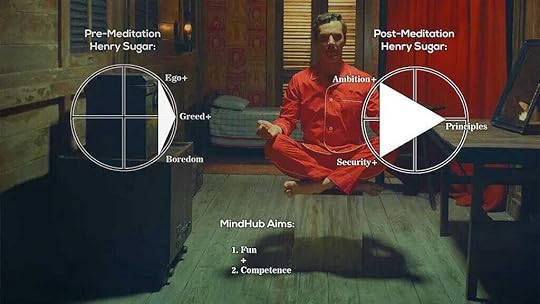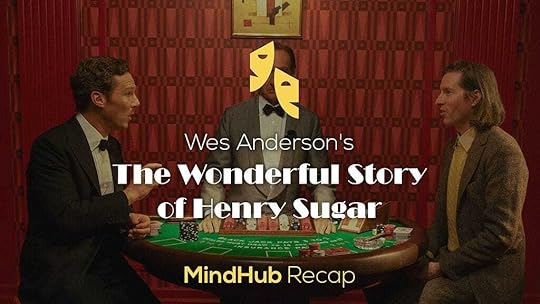MindHub Analysis — Henry Sugar
The Wonderful Story of Henry Sugar is the whimsical collaboration between Wes Andersen and Rhold Dahl we didn’t know we wanted, but that we can attest is indeed wonderful. In today’s video, we will attempt to explore personality transformations through this remarkable tale, particularly those “aha” moments when a person may realize that their behaviors have shifted. Henry Sugar’s personality shifts in dramatic fashion and illustrates well many of the extreme levels of drives in the MindHub system as well as the dynamism between life aims and drives. For some individuals, aims stay stable while drives shift, in other words, their lives are determined relatively more by their aims than their drives. In others, the reverse is true, and the drives work to reinforce or even determine the long-term aims. Henry Sugar is a good example of the former case.
https://medium.com/media/c047f6b7a0934ee0490ae7c177153305/hrefHenry Sugar’s main aim, or what directs his life, is the desire for novelty. He has a curiosity and a capriciousness that allows his personality a level of exaggerated flexibility, giving a theatrical quality to his behaviors regardless of what drives his behavior in the moment. This is captured well in the general ambiance of the film which also has more of the feel of a stage play with static set changes rather than a film. We are also granted with, as an audience, a reliable narrator who is not in the least sensitive about revealing Henry’s life details and personality as straightforwardly as possible and without any sugarcoating. He begins describing Henry as a rich man with an insatiable longing for more money and who would not share money with anyone, particularly not with a wife. In the MindHub system Henry begins with an extreme level of Greed as a primary drive. The narrator continues detailing how Henry believes he is very handsome, grooms with hairdressers and manicurists, dresses for attention, and drives a Ferrari. He also has a primary Ego drive, defined in the MindHub as the belief that one deserves more attention for being awesome. At this point, Henry himself picks up the narration and begins to speak of himself. He says he was drifting aimlessly in his mansion with thousands of books and nothing was of any interest to him, until one book grabbed his attention because of it’s unusualness. Henry also has a primary Boredom drive, doing things simply because he has nothing better to do, and likely doing many unrelated activities on a whim to fill his time, as we have learned previously he has no work or responsibilities.
Everything changes for Henry with the discovery of a book about a Guru from India who learns a meditative art that allows him to see without using his eyes. He finds the story and practice of visual meditation so captivating because he sees immediately how the meditation might be utilized to become wildly successful in gambling, more specifically to cheat at cards. With this insight, he becomes obsessed with the meditation practice. Henry shifts to incorporate an extreme Ambition primary drive. Real personalities have three primary drives at any given time and not more, so we might ask at this point what other drive will be sacrificed to give space for this new Ambition. We know from the narrator that it will not be the primary Ego. During meditation practice, it is stipulated that the one meditating must meditate on what they love best in the world, and Henry chooses to meditate on his own face. Such levels of self-love are reflected only in the Ego drive. Furthermore, as training progresses Henry is extremely proud of himself. He knows “it’s me, I am the one gifted to acquire meditative power at remarkable speed”. He knows he is amazing. By deduction, we can predict that the drive that will have to shift is his primary Greed, which foreshadows the irony of the story.
The narrator reminds us Henry never worked a day in his life, but at this point he decides to lock himself in his room to train five times a day for the next several years. In the MindHub system, extreme Ambition is isolation, which the film shows perfectly. At one point, Henry even stops grooming himself, a stark contrast to his previously perfectly groomed appearance, and there is clear indication that he is not going out at all including anachronistic food deliveries. This shows well how extreme levels of drive can affect the expression of the other drives making behaviors related with them less frequent. His sacrfices to Ambition pay off as he is able to achieve his goal and can see in his mind the other side of the playing cards as they come into the game. He is ready to try his new skill to acquire a fortune.
When Henry enters his formerly favorite casino, he has an averse reaction. He finds the Greedy people at the tables distasteful and horrible. When he uses his new power to make a risky move at Black Jack and win, he draws the attention of a crowd. He realizes it is “silly” to attract attention and must never do it again. From this point on he will have primary Security as a drive. In the scene immediately following this new drive is reinforced, as we are told Henry Sugar is not the real name of the protagonist as his real name must be protected. During his walk home from the casino, it is glaringly obvious to Henry that he is not excited about winning money anymore. He feels no thrill at having it and in the morning when he sees it on his table he doesn’t want it. He takes the stacks of bills to his balcony and begins throwing his money down to the street, creating chaos in the neighborhood. It is obvious Henry is not giving the money away because he cares about the individual people or even the groups of people down below, but is rather just having some fun. This moment also shows how a strong aim can affect behaviors, sometimes overriding drives. Henry decides to be smart and not attract attention, but at times can’t resist the pull to have a bit of fun or do something new and spontaneous. The drive for novelty can sometimes go in the direction of overindulgence or finding some chaos stimulating. However, it should not be confused with a Lust drive, since lust implies being compelled specifically by destructive behaviors. Henry’s version of fun is wholesome, even if it had some unintended destructive effects. When the police arrive immediately to scold Henry he feels genuinely remorseful and listens carefully to the officer’s scolding that you must give away money in the right way and to those who need it. He tells Henry to start hospitals and orphanages instead of throwing money into the street.
This interaction again changes Henry’s personality as he decides to give all his money to those in need. He has his grandest epiphany of the film. He designs the rest of his life’s work as well as the personality he must have to fulfil it. He decides to limit his profits from gambling each night, go to different casinos in different countries, and take on different disguises in order to keep a low profile. He keeps his extreme Ambition drive, making the same amount of money from gambling consistently each day. With such a lifestyle, moving from place to place and from persona to persona, he will sacrifice any personal life. The Ego drive is gone. He loves the idea of this life more than he loves himself. In place of the Ego drive, Henry has primary principles, the main principle being that taught by the policeman, that it is right to give to those in need and that the right way to do so is to create institutions to pour resources into for their benefit. Until the end, Henry will have primary Security, Ambition, and Principles, which is nearly diametrically opposite to his profile at the beginning of the story. Yet, despite the shift to a reactive, more planned, profile, the life Henry designs is wildly exciting and will be full of the novelty he craves.
In the end the film mentions that when Henry dies his work is complete and that people loved him for the good things he did. Interestingly enough, Compassion or caring for individual’s distress and Attachment caring for close people, were both conspicuously absent in Henry’s profile. He didn’t seem at any point to care for people, yet does incredible things for them. The surprising theme that emerges is the idea that if a person does good then they are good. Personality is not what we intend or say, but what we act out. We couldn’t agree more.

To purchase a copy of the MindHub book, search for ‘MindHub Personality Profiler’ in your preferred search engine or check the Amazon link. Any feedback would be greatly appreciated!
Support our work on Patreon and check our updates on X, Goodreads, Instagram, Rumble and YouTube.
 [image error]
[image error]



